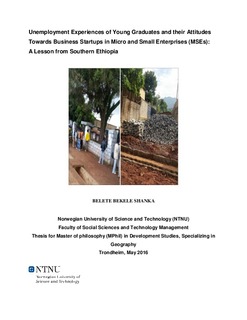| dc.description.abstract | This study is about the unemployment experiences of unemployed young graduates and their attitudes towards business startups in micro and small enterprises (MSEs) in Wolaita Sodo town, Southern Ethiopia. More specifically, it seeks to examine the job search experiences of unemployed young graduates, examine their unemployment experiences, identify the barriers and opportunities for business startups in MSEs and explore their attitudes towards business startups in MSEs. To address their job search experiences, concepts from school to work transition and human capital theory were used with other empirical examples. To address their unemployment experiences, this research used the human capital theory and the social exclusion concept. Important concepts such as youth and hope in the contemporary era, unemployment and entrepreneurship nexus, Entrepreneurship through MSEs, the role of formal education in MSE development and, supportive environment for job creation and other empirical examples are used to identify the barriers and opportunities for business startups in MSEs and to examine the attitudes of unemployed young graduates towards business startups in MSEs. Generally, the knowledge obtained from these issues together with the empirical examples were used as an interpretative base for this study.
This study employed the qualitative methodology and phenomenological approach, and four primary data collection tools, namely, semi-structured interviews, focus group discussion (FGD), elite interviews, as well as direct observation and secondary data sources. Semi-structured interviews and focus group discussions were used to obtain young graduates’ unemployment experiences and their attitudes towards business startups in MSEs. Moreover, elite interviews were conducted to gather relevant data to this thesis from experts coordinating MSEs and youth affairs in Sodo town. Direct observation was conducted to gain insight into the ways young graduates are looking for vacancies and the general status of MSEs in the study area. Research participants were recruited by using snowball and purposive sampling techniques.
From the findings of this study it is revealed that job search period is full of uncertainty for many and the school to work transition is not easy for most of the young graduates. The thesis found that unemployment experiences of young graduates varies depending on their gender, marital status, and level of education. The study indicated that prolonged unemployment among graduates leads to social exclusion rather than inclusion and wastes the knowledge acquired through a formal education. Besides, the study also examined unemployed young graduate’s attitudes towards business startups in MSEs. The outcomes indicate that positive images towards MSEs are mostly hindered by a lack of institutional support, lack of training and mentoring, lack of infrastructure, lack of recognizable role models and lack of inspiration from the society.
Finally, the recommendations that are supposed to be helpful in order to augment the involvement of young graduates towards business startups in MSEs were provided. | nb_NO |
